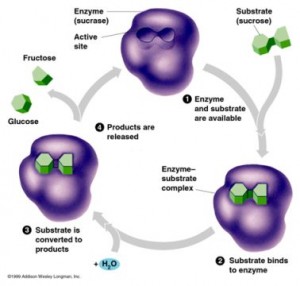
A brief view of how enzymes work
Do you often feel something not right but when you go to visit the doctors, there is nothing wrong with you?
This situation might be as what we termed as ‘sub-health state’, a situation brought about by the increased pressures of living which are taking a toll on our health. Usually one will have the symptoms such as dizziness, easily annoyed, headache, neck and shoulder ache, fatigue and lack of concentration, absent-minded, insomnia and profuse dreaming at night and so on.
Although the symptoms might seem not alarming at first, with time it can cause ageing and degrading of our organs, and if left unattended, the development may progress into disease.
According to research, our health is attributed by each cell since all disease originates at the cellular level and not so much at the organ or system level.
To have optimal health, we have to maintain a healthy metabolism in order to keep the cell homeostasis or balance. In this case, enzymes play a crucial role. Unfortunately, we are born with limited enzyme reserves. Not only we are born with limited enzyme reserves, our modern food manufacturing, processing and cooking can easily destroy most, if not all, of the enzymes that food contains. As a being we have no choice but to pull from our body’s own reserve of digestive and metabolic enzymes to break down food, this somehow will gradually weaken our immune system.
What are enzymes and in what way they affect our health?
Enzymes are made up of complex protein molecules and are found in every living cell. They are vital to our body’s ability to function properly by speeding up the rate of biochemical reactions. In general, enzymes that are produced in our body can be divided into two types:
- Digestive Enzymes: These are enzymes that are secreted along our gastrointestinal tract to help break down food so that nutrients can be absorbed and utilized by our body.
- Metabolic Enzymes: These enzymes facilitate almost all of the cell activities such as in the rebuilding of organs, connective tissue, bones and energy production.
However, research has shown enzymes production in our body diminishes significantly between ages 27 and 35. Moreover, with all the years of eating cooked and difficult-to-digest food, our body tends to become more acidic, thus slowing down the activity of enzymes. In addition, the diminishing of enzymes with age can also be due to other factors such as prolonged stress and lack of exercise as well.
Research studies showed that to live healthier, we must adopt a healthy lifestyle to increase enzymes in our body. To achieve this we can start by adding more raw food to our diet, especially vegetables, nuts, fruits, sprouts and seeds. If raw food does not appeal to you, enzyme supplementation can be used as a substitute instead.
The therapeutic health benefits of enzymes can be summarized as follows:
- Food digestion: Enzyme helps to break down food for optimal nutrient absorption and to replenish nutrients and alleviate fatigue.
- Metabolism: Enzyme promotes metabolism for efficient excretion of waste products from our body.
- Cell regeneration: Enzyme can stimulate cellular metabolism, promote regeneration of new cells and repair damaged cells, hence preventing premature ageing and improving skin complexion.
- Anti-inflammation: Enzyme also induces and strengthens white blood cells in our body to ward off inflammation and increase our body immunity.
- Blood purification and detoxification: Enzyme can function to disintegrate and excrete toxins and metabolic waste in blood, to promote smoother blood circulation thus maintains its viscosity.
- Balance body pH level: Enzyme helps balance acidity in our body to maintain the mild alkalinity of blood, hence increasing vitality and our energy levels.
Best,
Tan Kok Hui
Nutrition Made Simple, Life Made Rich






